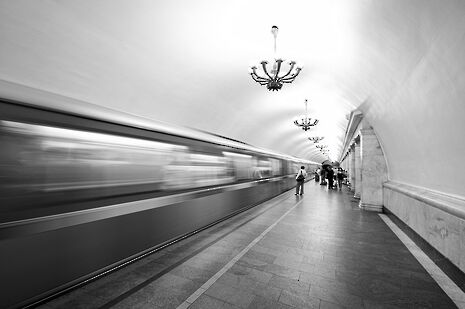Utopian Russia, Dystopian Russia
In her final column on Russian literature, Beth Bhargava explores its hopes and fears for the future

If Paris was the capital of the 19th century, Petersburg was its cathedral. Russia’s educated class was numerous, idle and largely excluded from political decision-making; the country naturally bred committed dreamers and elaborate fantasies, and its literature from the time is richly loaded with utopias.
The most influential text in this vein was Nikolai Chernishevskii’s Chto Delat?, or What is to be done? Penned when its author was imprisoned in the Peter and Paul Fortress for his subversive politics, this work inspired generations of revolutionaries with dream-sequences imagining a new way of life. These passages describe a world of sexual equality, cooperative, unalienated labour, and a corresponding release of humanity’s creative capacities. Many people read utopian texts in the light of the 20th century and the horrors of Stalinism; utopian authors may look endearingly innocent at best, and at worst harmfully naïve. Today’s readers inhabit a world of restricted political horizons founded upon a ‘common-sense’ consensus which projects a flawed notion of humanity’s present onto both past and future.
The revolution was one of the most powerful efforts to restructure society that the world has ever seen
In such a context, the dreams of those writers who, like Chernishevskii, describe a radical break in social structures and political realities seem barely comprehensible and self-evidently ridiculous. The history of the 20th century appears to have discredited and undermined the ideals of the 19th century. We in the 21st century are left with nothing, except maybe a bitter sense of superiority over those who failed to recognise harsh ‘realities’.
Stressing the continuities across the period allows us to view the relationship between 19th century ideals and subsequent politics differently. Two factors must be taken into consideration here. First, it was texts like Chto Delat? which inspired the leaders of the 1917 October Revolution: Lenin used Chernichevskii’s title for one of his own most significant publications on political thought, a deliberate tribute to the novelist. Second, despite the many tragedies which followed October – especially, but not exclusively, under the Stalinist regime – the Russian revolution is by no means reducible to these horrors.
At its heart, the revolution was one of the most powerful efforts to restructure society that the world has ever seen. As a prolonged moment of egalitarian possibility, it continued to inspire liberation struggles around the world throughout 20th century, particularly those of an anti-colonial nature.
The only way to permanently and effectively control humanity, is to deprive us of our humanity
Even today, many movements fighting to overthrow accepted political and social ‘realities’ are wont to look back on the October Revolution and its founding texts as a source of hope and inspiration. One such group is the tellingly-named Petersburg-based radical art collective Chto Delat, who explicitly relate the ‘first socialist worker’s [sic] self-organizations in Russia’ (modelled by Chernishevskii and actualised by Lenin) to their own self-understanding ‘as an artistic cell and also as a community organizer for a variety of cultural activities intent on politicizing “knowledge production”’.
Such projects bear an intriguing relation to the vision contained within Evgenii Zamiatin’s We. We is one of the finest examples of the Russian tradition of dystopian fiction which sits alongside the utopian fantasies described above. In this claustrophobic and disturbing novel, the author depicts an urban state founded on near-total surveillance. This is facilitated by the architecture of the polity, which is made entirely from glass panels in a hideous distortion of Chernishevskii’s dreams of sumptuous communal “glass palaces”.
Its protagonist and narrator, D-503, tests the limits of state-control with a transgressive romance which breaks both law and custom. Having revealed the human capacity to establish space for creative self-development and expression, even in an apparently totalitarian society, D-503 is ultimately betrayed, and arrested for his crimes. The novel’s close sees him forcibly turned from man to machine by means of a surgical operation to remove imagination and emotion. D-503 concludes with a statement of faith in, and desire for, the retention of the present oppressive order, but with rebellion erupting around him, its future is nevertheless left uncertain.
Zamyatin’s message can be read thus: the only way to permanently and effectively control humanity, is to deprive us of our humanity – and this is no easy task. In spite of the tragedy of D-503’s fate, the novel’s conclusion can be seen to contain a message of hope not dissimilar to that embraced by Chto Delat. It can be understood as a tacit agreement with the claim of D-503’s extraordinary lover, I-330, that – just as infinity forbids the existence of a highest number – there can be no final revolution. Politics is made to be broken, and Russian literature has always played a substantial part in this project.
 News / Report suggests Cambridge the hardest place to get a first in the country23 January 2026
News / Report suggests Cambridge the hardest place to get a first in the country23 January 2026 News / Reform candidate retracts claim of being Cambridge alum 26 January 2026
News / Reform candidate retracts claim of being Cambridge alum 26 January 2026 News / Cambridge ranks in the top ten for every subject area in 202623 January 2026
News / Cambridge ranks in the top ten for every subject area in 202623 January 2026 Comment / Cambridge has already become complacent on class23 January 2026
Comment / Cambridge has already become complacent on class23 January 2026 News / Palestine activists project slogans onto John’s24 January 2026
News / Palestine activists project slogans onto John’s24 January 2026









